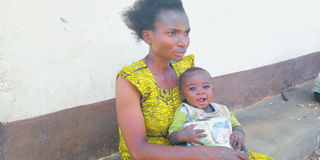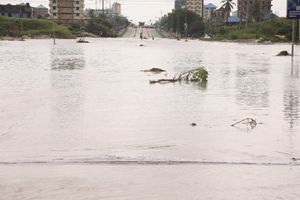She delivered her baby in a moving canoe in the lake

Scolastica Abednego holding her baby as she narrates her story and call on authorities to set up health care facciliities in rural areas. PHOTO | JONATHAN MUSA
What you need to know:
- Scolastica Abednego is among few people who have escaped death narrowly.
- The young woman from Chitandele Island, Chifumfu ward in Sengerema district is a woman of her own; do we say she is unique?
Mwanza. Time has gone but still she has the memory. With her face full of tears following painful labour and the shame she had to bear while giving birth aboard a canoe in Lake Victoria.
Scolastica Abednego is among few people who have escaped death narrowly.
The young woman from Chitandele Island, Chifumfu ward in Sengerema district is a woman of her own; do we say she is unique?
She gave birth in a locally made canoe on her way to Mwanza regional hospital, Sekou Toure for health checkup as she had complications.
Considering the number of people on the canoe, she was hoping she would arrive in Mwanza on time.
She has decided to share her story with the public to express her frustrations on how she would have easily died if the labour pains had started in the middle of the night or late in the evening when there is no means of transport available.
She is one amongst a few women who have managed to give birth successfully despite not attending prenatal care.
“The labour pains hit me hard,” Scolastica said.
She says in the Island, there is no health facility and anyone who falls sick is either taken to Sengerema District Hospital or Mwanza if the conditions persist.
The woman says, she stays with her mother-in-law who is extremely old, her husband Juma Lucas who is a casual labourer at Nyarugusu mining site in Geita region.
On April 27, this year she had very severe labour pains, which she says were weird as it was her first time.
Back in the house, whatever she had was only food, which had been sent to her the previous weekend by her husband.
“My husband usually come home after every two weeks, so at this time I was not expecting him because he had recently left and happened to send us some food and a few clothes,” she explained.
The Island has only two moving canoes plying to and from Mwanza city.
She says from Chitandele to Mwanza which is about three hours and they pay Sh7000 per trip using the old canoes and one has to book for a day or two.
On this particular day, they were only three ladies who were travelling in the vessel, out of nineteen passengers.
“The ladies covered me with their ‘vitenge’ while the vessel continued moving, but this does not mean that the rest of passengers who were men did not see the exercise, but was there any option?” she posed.
By the moment they docked at Kamanga ferry, Mwanza city, the child was already born.
She was taken to Sekou Toure Hospital. She stayed for four days and was later discharged.
She named her baby ‘Baraka’ meaning blessings bearing in mind her painful ordeal.
Chitandele with approximately 2800 households, according to the ward councilor Robert Madaha is among six Islands making up Chifumfu ward.
According to Mr Madaha the island does not have any health facility.
“There are high numbers of mothers and child mortality cases here, some are unreported,” he said.
Despite several ferries plying in Lake Victoria, no route has been formalized for the destination. The only possible means to Chitandele is by the use of canoes.
One of the speed boats owners who sought anonymity at Kamanga told Your Health that, Chitandele has very few passengers and therefore setting a route to the place will lead to a total loss of fuel, energy and time.
“People there are poor and no one wishes to make lose plying that route So it’s up to the government to improve the infrastructure and save lives of women,” he said.
In 2012, twelve pupils died from the same island when the canoe capsized.
During a random interview at Chitandele Island, many residents lamented that politicians have forgotten the area.
“I wonder why there is no school here and even a single health facility yet we vote in the leaders,” said Mr Thomas Mlimi, a resident of Chitendele.
But on his parte, Mwanza Regional Medical Officer, Leonard Subi, said in most cases, women from such areas with difficulties have to move closer to where they can easily access health care services.
He added that some of these women or mothers do not get the balance diet during pregnancy and also miss the prenatal care, which is so important.
“In the region for example, 78 women and children have died since January to May this year due to lack of various services including untimely health attendance,” Mr Subi said.
Meanwhile, economic experts say poor healthcare services in Sengerema rural areas is hurting the region’s efforts to attract new jobs and investment.
In late June 24h, 2017, deputy secretary in the Office of the President, Regional and Local Administration, Zainab Chagula, in a result based financing (RBF) seminar that attracted political leaders and health experts from eight regions in Mwanza, said a total death toll of 454 mothers with children under five years were reported in 2010/11 and that the number increased to 556 in 2015/16 in the whole country.
This was due to various reasons including lack of sufficient education and knowledge in the health sector.
“What is required is change, a change that begins with me and you, people are the workforce of every nation and the whole world. Let us strive to eliminate these cases amongst ourselves,” she stated.
According to Word Health Organization WHO, severe shortage of qualified health workers and geographical imbalances in the workforce in many low-income countries require the national health sector management to closely monitor and address issues related to the distribution of health workers across various types of health facilities.
In addition to the rural-urban movement in Tanzania, there is growing interest in the movement of health workers between the public and the church-run health sector. Church-run health services have been particularly important for health service delivery and run almost one-third of the health services especially in rural areas.
Some local politicians have promised to construct health centres in several places including Chitandele.




